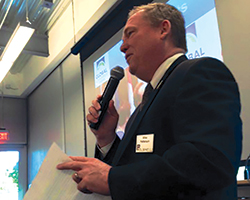
Mike Patterson, Polsinelli at Global Town Hall
“While much attention is given to the rising volume of U.S. imports from México over the past decade, what is often overlooked is the fact that México has emerged as the second destination in the world for U.S. exports,” said Consul General of Mexico in Phoenix Roberto Rodríguez, referring to statistics of the U.S. Census Bureau highlights. “In 2015, U.S. companies exported USD 236 billion in goods to México, more than a five-time increase since the implementation of NAFTA in 1994. As a measure of the significance of our bilateral trade, the United States exports more goods to México than to Brazil, India, Japan and the United Kingdom combined, with six million U.S. jobs relying on our bilateral trade.”
U.S. exports to Mexico exceed combined exports to Great Britain, France, Belgium and the Netherlands. The U.S. is Mexico’s largest source of Foreign Direct Investment (FDI) and the keystone for strategizing and implementing foreign and national security decisions. Both countries are interdependent to an extent that any cycle of economic growth or slowdown will impact both markets. Any threat to the stability of Mexico would also be a threat to the national security of the U.S., like the potential use of the border by organized crime, terrorist groups or enemy powers challenging the U.S. leadership in the world.
For globally minded entrepreneurs, the borderlands represent business opportunity: a place where the largest market in the world collides with one of the most vibrant economies of the 21st century and a market eager to consume American products and services. The U.S. Southwest border with Mexico is a region of opportunity. We must appreciate the growing Mexican middle class with their discretionary income as much as the group of Mexican magnates who can invest in the U.S., because both can help ensure the sustainability of the NAFTA region. We must envision North America as the most advanced and sustainable economic engine in 2030 because, at that moment, our traditional Western allies will be lagging behind the growth of economies such as China, India, Indonesia, Brazil and Russia, most of them being challengers of the existing U.S.-European shaped world order.
The Mexican economy will exceed the largest European economies and Japan’s by 2050. Do we already have an effective long-term strategy to attract more Mexican FDI into Arizona? Are we able to support our business strategies with our political intentions and state-of-the-art transportation infrastructure? Are we ready to host the Mexican transnational companies that will be looking into the U.S. to expand operations? Today Arizona hosts only about 10 large Mexican companies, most of them in mining, food and beverage industries.
Forty cents of every dollar spent on imports from Mexico comes back to the U.S., a quantity ten times greater than the four cents returning for each dollar paid on Chinese imports. Mexicans who legally cross the border to shop and visit Arizona represent about USD 7 million per day, according to the Arizona-Mexico Commission.
Consul General Rodríguez elaborates on the strategic value of Arizona in the U.S.-Mexico relationship: “México and Arizona are friends and strategic partners; both share multiple economic, social and cultural ties. México ranks as the first destination for Arizona’s exports, with USD 9.1 billion in 2015. An estimated 111,216 jobs in Arizona rely on bilateral trade with México. But beyond trade, our most valuable asset continues to be our people. Arizona is home to 1.7 million people of Mexican origin who contribute importantly to the prosperity of both Arizona and México. We need to reinforce our path to the future; unlike the past, we must build bridges and not walls.”
Last year, a group of business leaders with the support of the City of Phoenix were able to entice the Mexican Telecommunications tycoon, and the world’s second-richest man, Carlos Slim, to Arizona. Mr. Slim’s companies are heavily engaged in Mexico and throughout the Western Hemisphere. That trip opened the door to Mr. Slim’s companies in Arizona and helped facilitate other trade discussions for business and government leaders. Small business steps have been leading to more opportunities.
We need to continue hosting an open dialog to educate the general public and decision makers about the potential that Mexico represents, and advocate at the business level for a more coherent strategy to embrace Mexico. The 2016 Global and Arizona Town Hall discussions in Phoenix (hosted by Global Chamber) and in Tucson fostered a productive dialog with Mexican colleagues that will translate into better policy and more business and jobs for Arizona. If you want to be informed and partake of the dialog, we will be happy to provide you with the information to make your business be “global and unstoppable.”

















